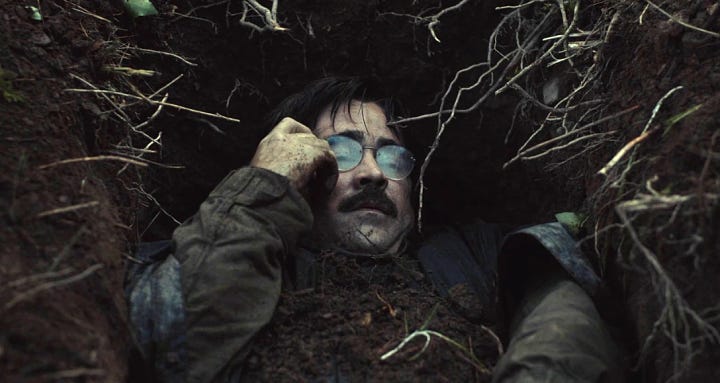Film Is Peerless in the Brash, Welcome Beauty Of Quirky Invention.
Yorgos Lanthimos and "Poor Things," "The Lobster," + appreciation of "Everything Everywhere All At Once," and wonderment about TV's willingness to be weird.
There is something rewarding about being delighted, over and over again; each payoff adding to the previous, our appreciation rising.
For a moment, I thought “validation” might be a better word than “rewarding,” but in this instance I think they are slightly apart in what I’m after. And what I’m after is creative surprise.
Creative surprise as I watch a film or a television series.
When it arrives, as a viewer I am rewarded. A gift has opened my mind. I can always rely on at least a handful of films in one year to provide it.
Television, this thing I tout for its superior storytelling without shortcuts and easy detours? I don’t know anymore.
The difference between a good television series and a very good series is often further than you’d think, certainly more than I’d like. And while well-executed storytelling on television has become so expected and ever present that when you see the opposite the reaction is often stunned surprise, in truth the level of relentless invention on the smaller screen is decreasing before our eyes.
But it remains vibrant and potent in film (which is an even cheerier realization in the Chilling Universe of Marvel and Branded Storytelling; already at a theater near you, as you are aware).
Watching the world of “Poor Things” unfold, as many of you have, everything is up for interpretation — exact time (Victorian London with a twist), modes of living (Victorian and fantastical) and nothing too firm or telling enters the concept (a mad scientist of sorts puts a baby’s brain in a young woman and she begins life anew, a creation not modeled to accept society or her particular role in it), and soon we are off and running on a tour-de-force of thinking differently.
Director Yorgos Lanthimos and writer Tony McNamara created their own entity from the book of the same name from Scottish writer Alasdair Gray. It’s Lanthimos’ seemingly insatiable love of inventive quirkiness that led to “Poor Things” hitting on so many humorous truths so perfectly, as he built up this skill of his through a series of acclaimed and odd (in a much appreciated way) films that came before.
“The Lobster” is one such film. Getting to watch them both so close together recently was a lovely way to appreciate Lanthimos.
I make no claim to be uber urgent in my devouring of new releases as many already know, and similarly make no claim to be a film historian/filmologist about deep catalogues of esteemed directors (spending so long as a television critic certainly didn’t open up free hours for such thing). But I feel my warm embrace of Lanthimos will undoubtedly grow, and quickly, into my similar love and connection to Wes Anderson.
There is a pattern; there is a trait.
Reviews of both films are plentiful so that’s not the point here. It’s enough to be awed by Lanthimos’ reverence for the absurd and his ability to infuse it not only with comedy (probably the entry-level easiest of the form) but also with sincerity and humanity. You can decide on your own if “Poor Things” is a feminist film or whether Lanthimos’ take on female sexuality (or male sexual proclivities for that matter) aligns with your beliefs, as all such things invariably end with a mileage variance of some degree.
But he is, without question, borderless in his pursuit of creative invention (and no, as mentioned above, I have not seen the entire oeuvre); the clipped sadness about love in “The Lobster” to the exuberant exploration of life’s pleasures in “Poor Things” attest to that and offer a bounty of visual treats and excellent writing.
“The Lobster,” made so quirkily perfect by Lanthimos and longtime writing partner Efthimis Filippou, brought out a kind of zealot’s abandon in me — “the world needs more of these films!” And, yes, I know that the world already has a lot; there’s no shame in asking for more. It’s hard not to watch “Poor Things” and “The Lobster” on a loop, after a brief respite, in a devout show of gratitude for the effort made, the intelligence and cleverness mustered.


Keep reading with a 7-day free trial
Subscribe to Tim Goodman / Bastard Machine to keep reading this post and get 7 days of free access to the full post archives.







